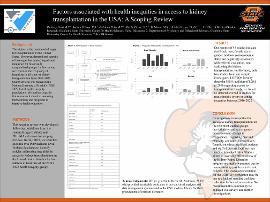| dc.contributor.author | Ernst, Zachary | |
| dc.contributor.author | Wilson, Andrew | |
| dc.contributor.author | Peña, Andriana | |
| dc.contributor.author | Love, Mitchell | |
| dc.contributor.author | Moore, Ty | |
| dc.contributor.author | Vassar, Matt | |
| dc.date.accessioned | 2023-11-02T20:44:08Z | |
| dc.date.available | 2023-11-02T20:44:08Z | |
| dc.date.issued | 2023-02-17 | |
| dc.identifier | ouhd_Ernst_factorsassociatedwithhealthinequities_2023 | |
| dc.identifier.citation | Ernst, Z., Wilson, A., Peña, A., Love, M., Moore, T., and Vassar, M. (2023, February 17). Factors associated with health inequities in access to kidney transplantation in the USA: A scoping review. Poster presented at Research Week, Oklahoma State University Center for Health Sciences, Tulsa, Ok. | |
| dc.identifier.uri | https://hdl.handle.net/11244/339876 | |
| dc.description.abstract | Background: The kidney is the most needed organ for transplantation in the United States. However, demand and scarcity of this organ has caused significant inequities for historically marginalized groups. In this review, we report on the frequency of inequities in all steps of kidney transplantation from 2016-2022. Search criteria was based on the National Institute of Health's (NIH) 2022 list of health inequity populations, which includes: race and ethnicity; sex or gender; Lesbian, Gay, Bisexual, Transgender, Queer + (LGBTQ+); underserved rural communities; education level; income; and occupation status. We outline steps for future research aimed at assessing interventions and programs to improve health outcomes. | |
| dc.description.abstract | Methods: This scoping review was developed following guidelines from the Joanna Briggs Institute and PRISMA extension for scoping reviews. In July 2022, we searched Medline (via PubMed) and Ovid Embase databases to identify articles addressing inequities in access to kidney transplantation in the United States. Articles had to address at least one of the NIH’s 2022 health inequity groups. | |
| dc.description.abstract | Results: Our sample of 42 studies indicate that Black race, female sex or gender, and low socioeconomic status are negatively associated with referral, evaluation, and waitlisting for kidney transplantation. Furthermore, only two studies from our sample investigated LGBTQ+ identity since the NIH’s addition of SGM in 2016 regarding access to transplantation. Lastly, we found no detectable trend in studies for race/ethnicity or sex or gender inequities between 2016-2022. | |
| dc.description.abstract | Conclusion: Investigations in inequities for access to kidney transplantation for the two most studied groups, race/ethnicity and sex or gender, have shown no change in frequencies. Regarding race and ethnicity, continued interventions focused on educating Black patients and staff of dialysis facilities may increase transplant rates. Studies aimed at assessing effectiveness of the Kidney Paired Donation program are highly warranted due to incompatibility problems in female patients. The sparse representation for the LGBTQ+ population may be due to a lack of standardized data collection for sexual orientation. We recommend this community be engaged via surveys and further investigations. | |
| dc.format | application/pdf | |
| dc.language | en_US | |
| dc.publisher | Oklahoma State University Center for Health Sciences | |
| dc.rights | The author(s) retain the copyright or have the right to deposit the item giving the Oklahoma State University Library a limited, non-exclusive right to share this material in its institutional repository. Contact Digital Resources and Discovery Services at lib-dls@okstate.edu or 405-744-9161 for the permission policy on the use, reproduction or distribution of this material. | |
| dc.title | Factors associated with health inequities in access to kidney transplantation in the USA: A scoping review | |
| osu.filename | ouhd_Ernst_factorsassociatedwithhealthinequities_2023.pdf | |
| dc.type.genre | Presentation | |
| dc.type.material | Text | |
| dc.subject.keywords | kidney transplantation | |
| dc.subject.keywords | inequities | |
| dc.subject.keywords | race | |
| dc.subject.keywords | ethnicity | |
